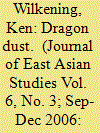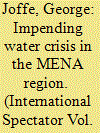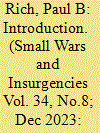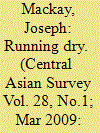| Srl | Item |
| 1 |
ID:
181954


|
|
|
|
|
| Summary/Abstract |
While previous studies have focused on how political and economic factors fuel herder-farmer conflicts, there is a dearth of knowledge on how desertification-induced migration amidst ungoverned spaces affect herder-farmer conflicts in Nigeria. Using data from qualitative dominant mixed method, this study interrogates how desertification-induced migration and state failure to provide security governance affect herder-farmer conflicts in Nigeria. It argued that poor security governance escalates the southward migration of herders and contributes to the intensification of herder-farmer conflicts in Nigeria. These conflicts endanger livelihoods, fuel population displacements, and undermine human security. The study concludes that effective security governance amidst increased desertification in Northern Nigeria presents an opportunity for regulating southward migration of herders, mitigating herder-farmer conflicts, and promoting human security in Nigeria.
|
|
|
|
|
|
|
|
|
|
|
|
|
|
|
|
| 2 |
ID:
075474


|
|
|
|
|
| Publication |
2006.
|
| Summary/Abstract |
Are scientific or nonscientific factors most influential in initiating international cooperation on newly emerging transboundary environmental problems in the Asia and Pacific region? In a case study of long-range atmospheric transport of dust, which is linked to desertification in China and Mongolia, the relative influence of scientific versus nonscientific factors in promoting cooperation in the Asia and Pacific region is analyzed. The study examines two dimensions of the problem-Northeast Asia and North America-and demonstrates that similar to the distance-dependence of the problem (i.e., dust concentrations decrease the greater the distance from the sources), cooperation follows a parallel relationship (i.e., motivation to cooperate decreases the greater the distance from the sources). Scientific cooperation in Northeast Asia is being institutionalized, but North America has not joined this effort. A synergy between factors must be invoked to explain this situation. In both cases, obvious and often dramatic negative impacts of massive dust storms are an enabling factor allowing more subtle science-related factors to come to the fore.
|
|
|
|
|
|
|
|
|
|
|
|
|
|
|
|
| 3 |
ID:
147932


|
|
|
|
|
| Summary/Abstract |
In many respects the worsening water scarcity in the Middle East and North Africa has become an object-lesson in the water crisis facing the wider world as climate change becomes a reality. Although northern and southern temperate zones are likely to see increases in precipitation, the equatorial region will face increasing desertification as access to water declines in the face of continuing demographic growth. Competition over increasingly scarce resources will have major geopolitical and security implications and the Middle Eastern and North Africa region will act as a paradigm of what happens in a biome of water scarcity.
|
|
|
|
|
|
|
|
|
|
|
|
|
|
|
|
| 4 |
ID:
192660


|
|
|
|
|
| Summary/Abstract |
This special issue contains five papers dealing with various aspects of climate change and its relationship to patterns of insurgency and terrorism. This is the first special issue in this journal on a topic that increasingly dominates the media and wider political discussion, though SWI has published some papers previously in this area, most notably one by Marina Malamud in 2018 that usefully categorised climate-change conflicts into four types: 1) those linked to the environment into resource-based conflict; 2) a warfare ecology paradigm referring to non-premeditated change to the environment as a result of military conflict; 3) warfare in which the environment was the target and 4) an insurgency-conflict intersection in which climate change increased the likelihood and frequency of war and conflict.Footnote1 These four categories have helped inform the approach taken in this introduction, especially the last relating to the probable impact of global climate change on insurgencies.
|
|
|
|
|
|
|
|
|
|
|
|
|
|
|
|
| 5 |
ID:
192664


|
|
|
|
|
| Summary/Abstract |
Desertification-induced conflict involving pastoralists and farmers is primarily driven by competition for water, forage, and land, other factors like ethnicity and religion also come into play. This paper utilizes descriptive analysis and secondary data, adopting the Economic & Migration Theory to explain the issue in the southern frontiers. Findings from the paper show that in the southward frontiers, the conflict has taken a different dimension due to differences in culture and religion. The migration from the core north which has been ravaged by desertification to the south has increased confrontation between these groups.
|
|
|
|
|
|
|
|
|
|
|
|
|
|
|
|
| 6 |
ID:
087681


|
|
|
|
|
| Publication |
2009.
|
| Summary/Abstract |
The Aral Sea disaster is the result of Soviet-era irrigation policy. The collapse of the Soviet Union left the issue under the purview of international law. This essay addresses how this shift has affected attempts to slow or reverse the sea's depletion. Treaties on the non-navigation use of international watercourses and on the prevention of desertification have had little effect. While a number of regional instruments and arrangements have been brought to bear, they have also done little to reverse damage to the sea. Finally, attempts to regulate the issue through domestic law, as evidenced in the case of Kyrgyzstan, have done little as well. While some progress has recently been made under the auspices of the World Bank, it is not a result of international law. The conclusion is that the shift from domestic to international law has little improved the situation, and may have made matters worse.
|
|
|
|
|
|
|
|
|
|
|
|
|
|
|
|